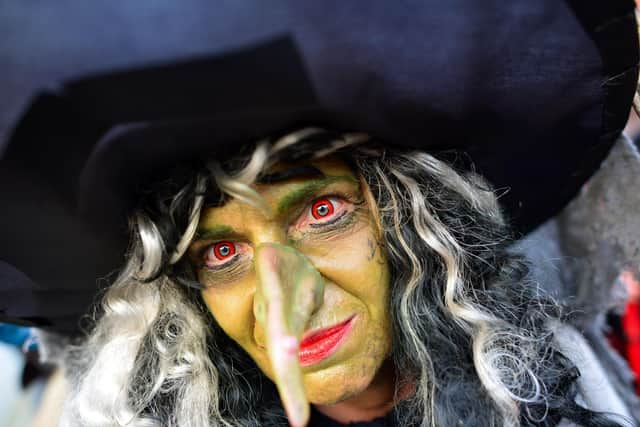How young women are complicit in patriarchy turning middle-aged women into 'hags' to be ignored and belittled – Susan Dalgety
The transformation of a woman from being no different to the man she works alongside to an almost invisible, slightly repellent, rather stupid, middle-aged crone is as imperceptible as it is inexorable. One day you’re on top of your game, with new recruits and bosses alike hanging on to your every word. The next, deep sighs and raised eyebrows greet your every suggestion. Ideas that were once dubbed as brilliant are now dismissed almost before they are out of your mouth. Conversations peter out when you walk into a room. And invitations to the pub for an impromptu beer after work dry up.
I remember asking my boss – a thoughtful, clever man – why he thought society dismissed women over 50? Why was I regarded as a has-been while he, a similar age, was only hitting his professional stride. He raised an eyebrow. “Surely that has changed,” he said. I looked at him. “Come on, be honest,” I replied. “Women over 50 are largely invisible. We have outlasted our usefulness.” He paused for a moment, then slowly nodded. “You’re right,” he said. “I’m sorry.”
Advertisement
Hide AdAdvertisement
Hide AdAnd at that moment, I realised I had become a hag. I had served my purpose to society as a (potentially) fertile female. My laughter lines and grey hair were not ‘distinguished’, but proof that I was no longer a ‘real’ woman. My decades of professional and life experience were irrelevant. I had reached my ‘best before date’.
It was now time for me to retreat, along with all the other hags, to life’s backroom and wait for death. But hold on. Before you die, would you mind becoming a full-time unpaid childminder or providing round-the-clock care for an elderly relative? After all, you have nothing else to do, and older women are just better at that sort of thing.
My response to this sudden change in my status was to run away. Since my early 50s, I have spent much of my time (and most of my pension pot) travelling. I don’t mind whether it’s a meander down England’s stunning east coast or a road trip across the mid-west of America, the moment I close my front door and head off, I feel back in control.
A foolish, but thankfully brief, re-entry into the traditional job market, where I found myself the butt of every young man’s jokes and dismissed by younger women I – stupidly – thought were sisters, served as a reminder that I was ‘past it’ in a way only a middle-aged woman can be. I handed in my work pass and headed off to Greece.
Reading Victoria Smith’s new book, Hags: The Demonisation of Middle-aged Women, this week has been an uncomfortable reminder of my own transition from what Smith describes as the “three Fs” (“femininity, fertility and f***ability”) to dried-up old prune. In her insightful but devastating critique, she argues that it is not just men who perpetuate the patriarchal narrative that younger women have a higher social status than their older sisters, but that young women collude in this myth too. They see their future in our lined faces and, fearful of what lies ahead, despise us for reminding them of their fate.


Shamefully, I remember giggling with a woman friend about the older women in the Labour Party who insisted on speaking up at meetings. “God, I hope I never turn into Vi,” I remember saying. “Shoot me if I do,” I giggled. Today, I am Vi.
The gender wars of the last five years, where the very definition of woman has been up for grabs, have accentuated this deep generational divide between women. Many women under 40 – particularly those on the left – have bought into the myth that womanhood is simply a costume to be worn. Waving intersectionality at us hags, as if we didn’t understand the impact of a woman’s class and race on her oppression, they chirrup “trans women are women”. Femaleness is simply a matter of buying a new frock from Primark, they seem to argue.
Victoria Smith asserts that it is not surprising that it is largely women over 45 – those of us who have survived the biological reality of our female bodies, from infertility to unplanned pregnancies, and are now coping with the menopause and old age – who have chosen to speak out against extreme gender ideology. Our Caesarean scars, varicose veins and brittle bones are a constant reminder that, regardless of our socio-economic status, it is our female bodies that have shaped our destiny. And we are righteously angry, fed up of the misogyny and ageism that has influenced attempts to sideline us.
Advertisement
Hide AdAdvertisement
Hide AdVictoria Smith ends her book with five “modest” proposals for shaping a new feminism, one that “sheds itself of the self-hate of ageism”. I am not sure whether women – of any age – are ready to ditch their t-shirts and mugs as she suggests; I for one am rather fond of my Forth Valley Feminists mug – but her call for a new feminist intergenerational narrative is spot on.
She argues that instead of young women pandering to the patriarchal lie that women are only useful for half their lives, women of all ages should be rewriting our story. And where better to start than with the glorious Gloria Steinem, who wrote in 1979 that “women may be the one group that grows more radical with age.”
We hags may have lost our ‘three Fs” but frankly we don’t care, as we have no more Fs to give. So, young women, before it’s too late, come join us on the other side. Together, we really could smash the patriarchy.
Comments
Want to join the conversation? Please or to comment on this article.